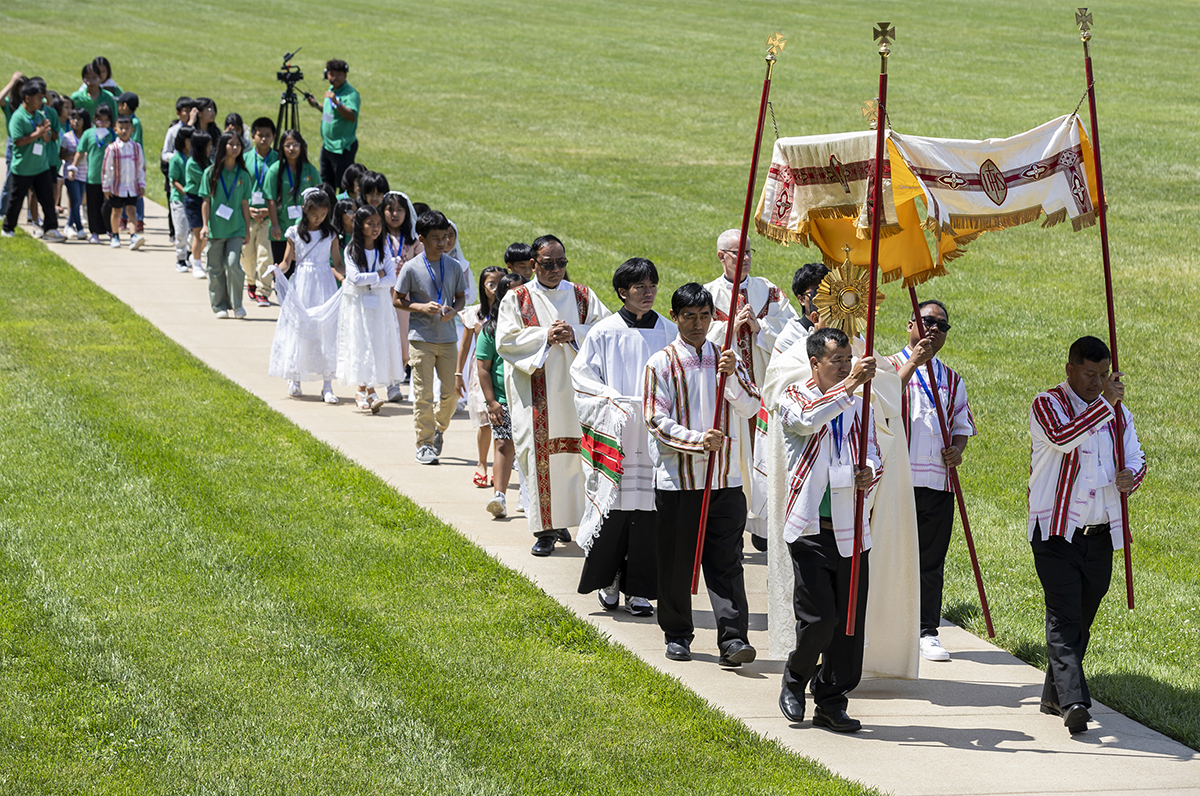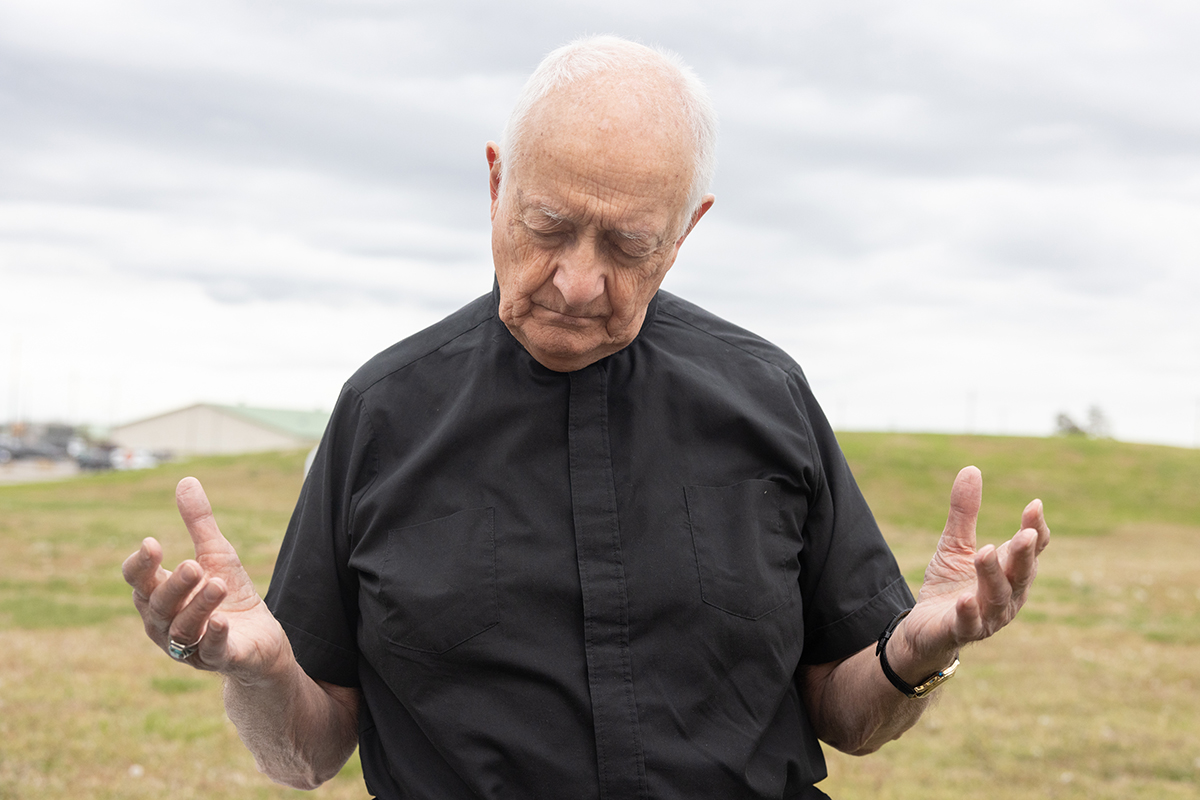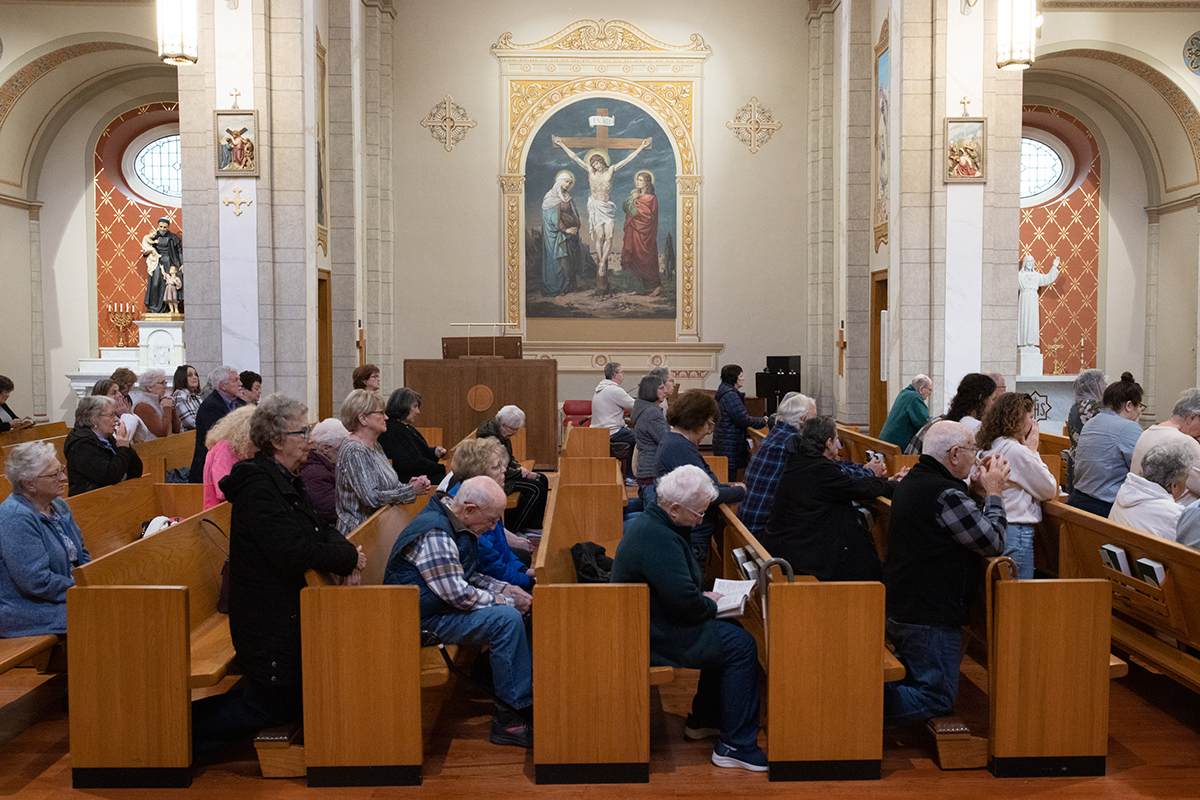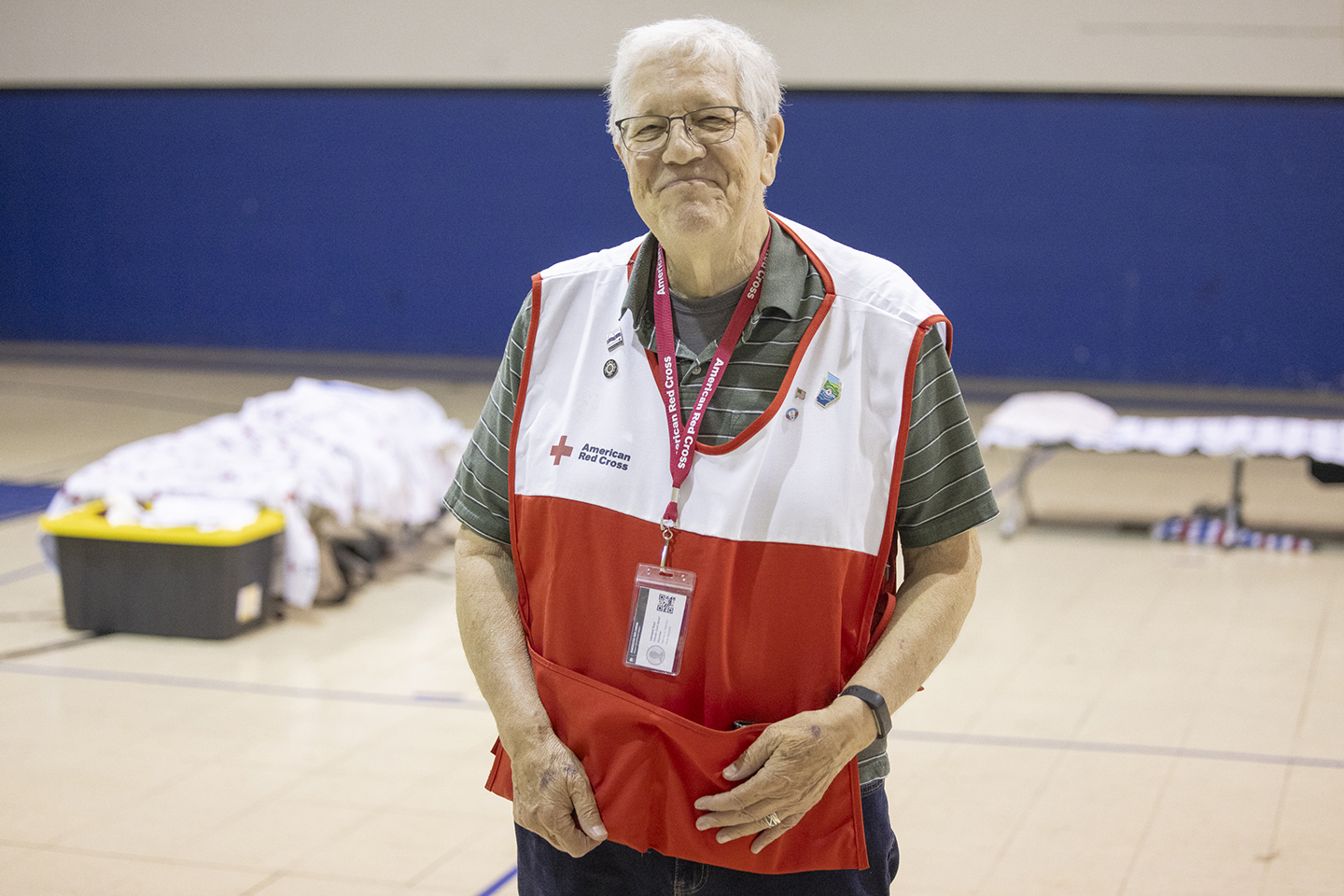Walking with God’s people
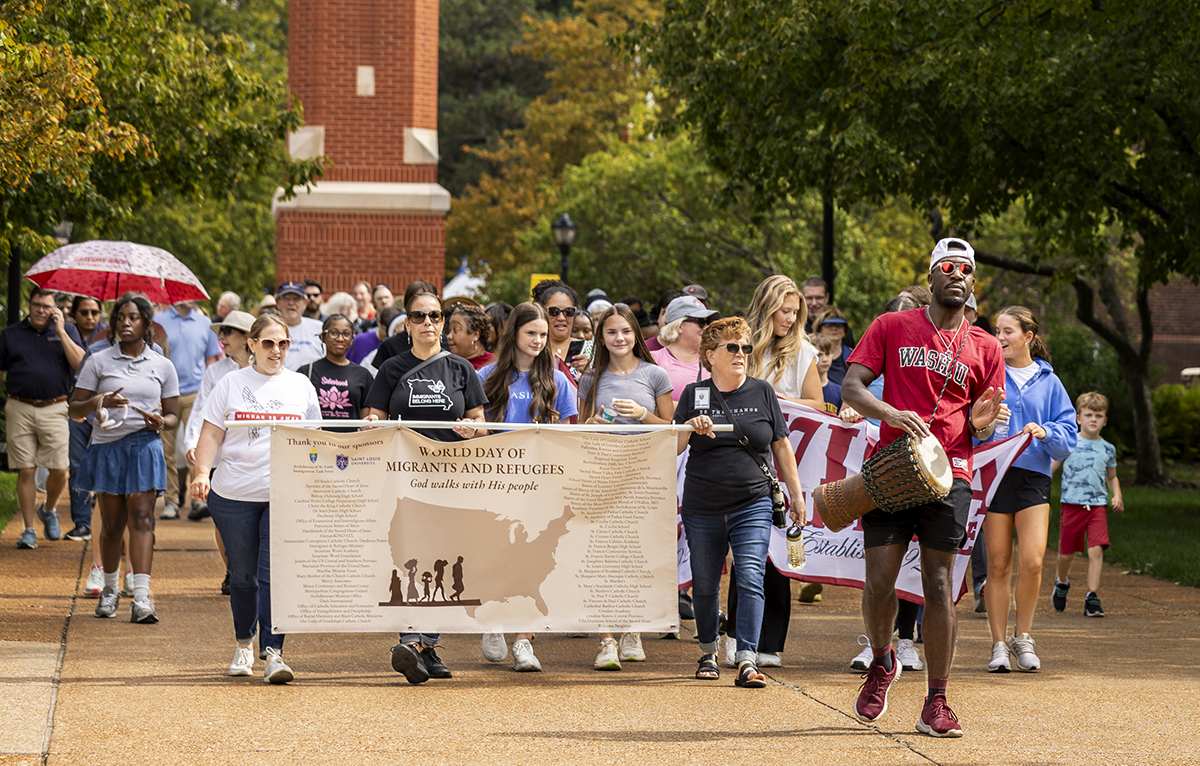
Archdiocese marks World Day of Migrants and Refugees with solidarity walk, teach-in
It took four months for Yusmary Perozo and her family to walk from Peru to the U.S.-Mexico border.
Facing ongoing threats from her native Venezuela, Perozo and her husband, Smiler Camarío, and children, ages 12, 7 and 1, decided to seek asylum in the United States.
“Without knowing what the future held, not knowing how to get here or how we were going to make it, we decided to start the journey,” Perozo said through an interpreter. “We only committed ourselves to our Savior, Jesus, and we started the journey.”
After crossing the harrowing Darién Gap and making their way north through Central America, they entered the U.S. at a Border Control checkpoint and were sent first to Denver, then St. Louis. Not knowing a soul, they slept on the street before a series of phone calls led them to the Immigrant and Refugee Ministry at St. Pius V Church. The ministry helped them find a place to stay and connected them to a host of other resources.
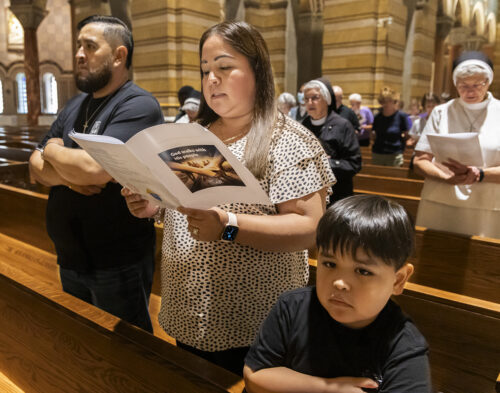
The Pinto family — Eugenio, left, Landy and Tadeo, 6 — attended Mass at the Cathedral Basilica of Saint Louis for the World Day of Migrants and Refugees on Sept. 29.
“We are working now; we have work permits. We are on our way, walking straight, doing everything right,” Perozo said. “Immigrating is not easy, because your heart is in your country, but it’s a better future for our kids.”
Perozo was one of three immigrants who shared their experiences as part of a Catholic Teach-In on Migration on Sept. 25 at Our Lady of Lourdes Church in University City. The teach-in was hosted by the archdiocesan Immigration Task Force and other partners to mark National Migration Week and the World Day of Migrants and Refugees, celebrated on the last Sunday of September each year to encourage Catholics to recognize the dignity of migrants by engaging in prayer, reflection and action.

Juan Medina, a parishioner at Our Lady of Guadalupe in Ferguson, crossed into the United States from Mexico illegally in 1984. After the Immigration Reform and Control Act passed in 1986, he was able to get permanent residency status (his “green card”), and in 1996, he became a U.S. citizen.
He now owns a small plaster company and has been a citizen for nearly 30 years. “But my color is still the same. That’s never going to change. So it’s still hard for me,” he said. Often, general contractors “believe a Hispanic can be a worker, but not the owner of the company.”
His fellow parishioners, though, have made him feel like he has a new home.
“(Home) used to be back in Mexico, but now it is Our Lady of Guadalupe,” he said. “And I have the privilege of serving this Church, and by being an owner of my company, this gives me the opportunity to help my parish and to serve so many different groups.”
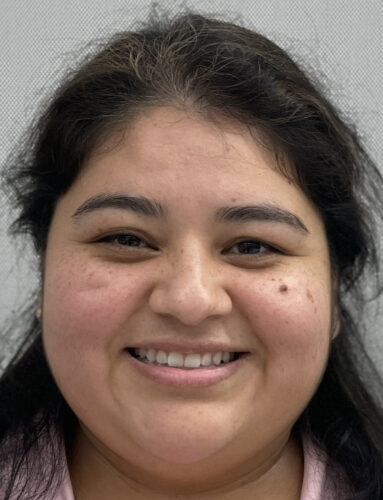
Belem Gomez Cruz, a parishioner at San Juan Diego Parish in O’Fallon, was brought to the United States from Mexico by her parents when she was 12. She now has legal status under the Deferred Action for Childhood Arrivals (DACA) program but lives with the ongoing uncertainty that her status — which has to be renewed every two years — could be canceled at any time.
“It’s hard to be reminded every single time that I have to renew that even though I’ve been here for 20 years and I’m paying taxes and I’m doing everything right, that I’m not a citizen,” she said, “that even though I’ve been here most of my life, I cannot call this home, even though my family is here.”
Gomez Cruz now works as a medical interpreter and serves on the archdiocesan Immigration Task Force. She asked those gathered to remember DACA recipients like her and other immigrants when weighing voting choices in future elections.
“I have faith in people like you guys, who have the opportunity to vote, to vote for everybody, to be our voices,” she said. “Because we can’t really do much.”
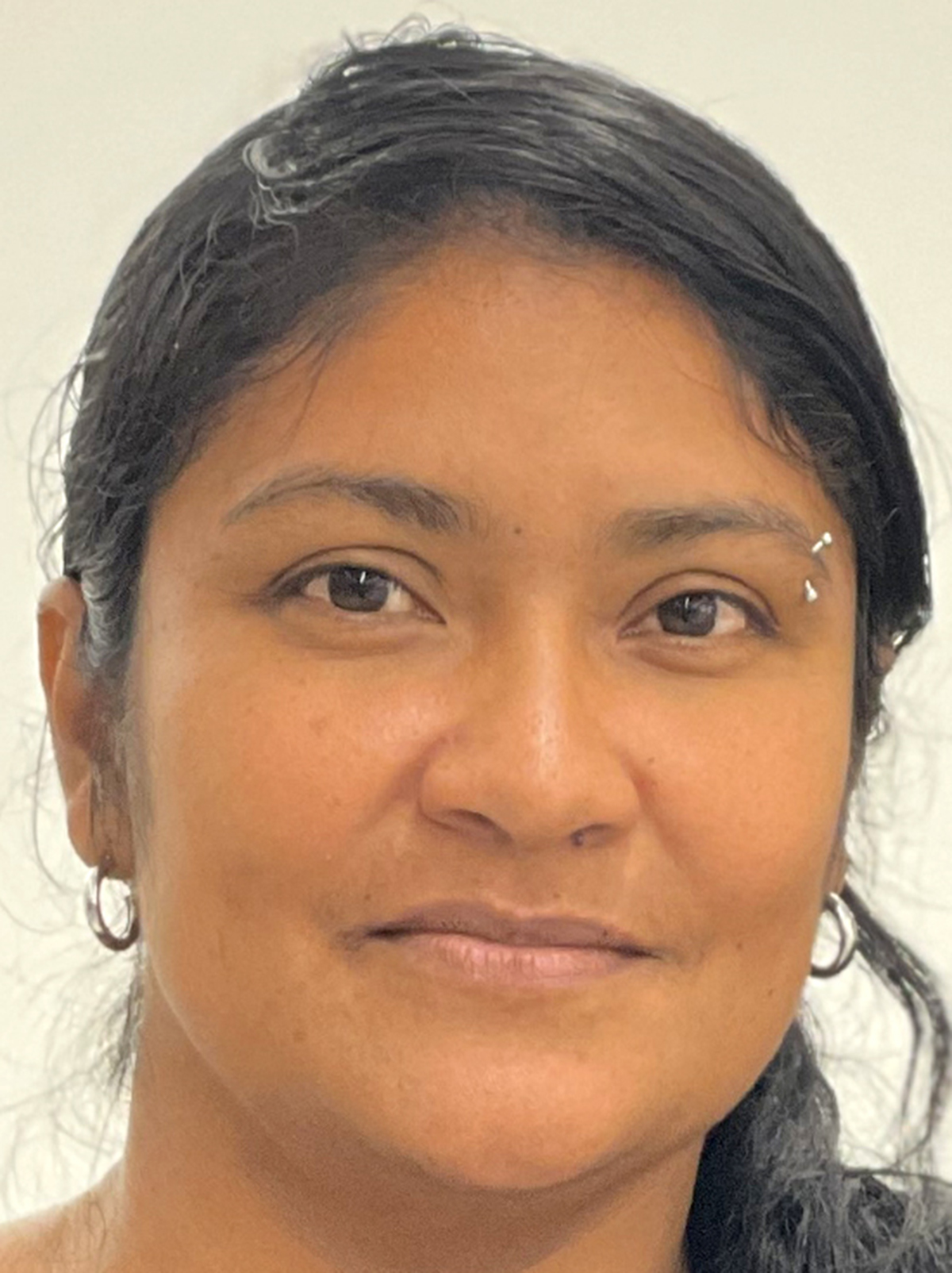
“Immigrating is not easy, because your heart is in your country, but it’s a better future for our kids.”
— Yusmary Perozo
Walking with His people
On Sept. 29, about 100 people from the archdiocese participated in a Solidarity Walk for the World Day of Migrants and Refugees, a fitting event for this year’s theme: “God walks with His people.”
“God not only walks with His people, but also within them, in the sense that He identifies Himself with men and women on their journey through history, particularly with the least, the poor and the marginalized. In this we see an extension of the mystery of the Incarnation,” Pope Francis wrote in his message for the day. “For this reason, the encounter with the migrant, as with every brother and sister in need, ‘is also an encounter with Christ. He Himself said so. It is He who knocks on our door, hungry, thirsty, an outsider, naked, sick and imprisoned, asking to be met and assisted.’”
Religious sisters, priests and laypeople, including student groups from Cardinal Ritter College Prep and Villa Duchesne, walked from the Saint Louis University clocktower down Lindell Boulevard to the Cathedral Basilica of Saint Louis. Incarnate Word parishioner Seth Akakpo-Lado led the group, beating a steady rhythm on a djembe.
Sharon Neumeister, a lay associate with the Sisters of Mercy who attends the Catholic Student Center at Washington University, walked alongside several other members of her community, carrying signs with the simple message “Mercy for immigrants.”
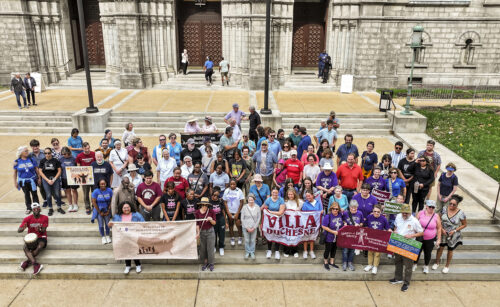
Earlier this year, Neumeister participated in an immersion trip to El Paso, Texas, and Juarez, Mexico, where Mercy sisters serve people on the border. Her encounters with migrant families moved her not just to participate in more events like the walk, but also to speak up and share her experiences with family and friends, even when it feels difficult to talk about the topic of immigration.
“I’m a person who doesn’t always like to start a difficult conversation like that, but it needs to happen, and I’m trying to do more of it. Because I think that people need to hear from someone who’s been there what their experience was, as opposed to clips of things on TV that don’t always belong or fit together,” she said. “…Our Catholic faith calls us to address these issues, not turn away from them.”
After the walk, Auxiliary Bishop Mark S. Rivituso celebrated a special Mass that included readings and prayers of the faithful in six different languages — English, Spanish, Portuguese, Vietnamese, Swahili and Tagalog — as well as multilingual music and matachines dancers.
Father Freddy Devaraj, associate pastor at Christ the King Parish in University City, gave the homily, noting that he himself immigrated to the U.S. from India in 2015. The Holy Family, who fled to Egypt to escape violence after Jesus’ birth, understands the pain of migrants and refugees, he said. Jesus knows “exactly what it meant to be an alien in another land. He was an alien Himself.”
According to the United Nations, about 1 in 30 people in the world are migrants living outside the country where they were born, Father Deveraj said. But “our identity is not found in a statistic or number,” he said. “Our identity is in the fact that we belong to a great family of faith.”
Read Pope Francis’ message for the 110th World Day of Migrants and Refugees: stlreview.com/47LY0Tz
Archidocese marks World Day of Migrants and Refugees with solidarity walk, teach-in
Subscribe to Read All St. Louis Review Stories
All readers receive 5 stories to read free per month. After that, readers will need to be logged in.
If you are currently receive the St. Louis Review at your home or office, please send your name and address (and subscriber id if you know it) to subscriptions@stlouisreview.com to get your login information.
If you are not currently a subscriber to the St. Louis Review, please contact subscriptions@stlouisreview.com for information on how to subscribe.

